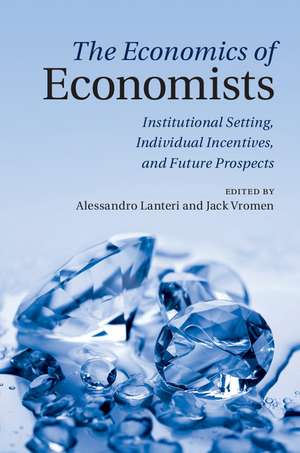The Economics of Economists: Institutional Setting, Individual Incentives, and Future Prospects
Editat de Alessandro Lanteri, Jack Vromenen Limba Engleză Hardback – 4 iun 2014
Preț: 783.67 lei
Preț vechi: 911.24 lei
-14% Nou
Puncte Express: 1176
Preț estimativ în valută:
149.98€ • 155.100$ • 123.81£
149.98€ • 155.100$ • 123.81£
Carte tipărită la comandă
Livrare economică 15-29 aprilie
Preluare comenzi: 021 569.72.76
Specificații
ISBN-13: 9781107015708
ISBN-10: 1107015707
Pagini: 378
Ilustrații: 13 b/w illus. 24 tables
Dimensiuni: 152 x 229 x 22 mm
Greutate: 0.66 kg
Editura: Cambridge University Press
Colecția Cambridge University Press
Locul publicării:New York, United States
ISBN-10: 1107015707
Pagini: 378
Ilustrații: 13 b/w illus. 24 tables
Dimensiuni: 152 x 229 x 22 mm
Greutate: 0.66 kg
Editura: Cambridge University Press
Colecția Cambridge University Press
Locul publicării:New York, United States
Cuprins
Introduction Alessandro Lanteri and Jack Vromen; Part I. The Institutional Setting of Academic Economics: 1. The culture of academic economics Arjo Klamer; 2. The construction of a global profession: the transnationalization of economics Marion Fourcade; 3. Academic rankings between the 'Republic of Science' and 'New Public Management' Margit Osterloh and Bruno S. Frey; 4. Gatekeepers of economics: the network of editorial boards in economic journals Alberto Baccini and Lucio Barabesi; Part II. The Individual Incentives of Professional Economists: 5. Can European economics compete with US economics? And should it? David Colander; 6. Career patterns of economics PhDs: a decade of outcomes for the class of 1997 Wendy Stock and John Siegfried; 7. Scientific norms and the values of economists: the case of priority fights in economics Wade Hands; Part III. Challenges and Solutions: 8. Why economics is on the wrong track Deirdre McCloskey; 9. Do we try to teach our students too much? Robert Frank; 10. The perils of narrative teaching in economics Jack Vromen; 11. Academic women's careers in the social sciences Donna Ginther and Shulamit Kahn; 12. Ought (only) economists to defect? Stereotypes, identity and the prisoner's dilemma Alessandro Lanteri and Salvatore Rizzello; 13. The financial crisis and the systemic failure of academic economics David Colander, Hans Follmer, Armin Haas, Michael Goldberg, Katarina Juselius, Alan Kirman, Thomas Lux and Brigitte Sloth; Index.
Recenzii
'This is a very important and much-needed contribution to scholarship on the economics profession. Is there herding behavior in economics? Is the profession unable to address issues of fundamental concern on account of its social organization? These questions and many others are investigated in this very welcome volume.' John B. Davis, Marquette University, Wisconsin and Universiteit van Amsterdam
'This collection of essays offers vivid images of the academic economic profession, taken from various angles and perspectives. It is attentive to the practices, self-representations and stereotypes of this tribe and judicious on the conflicting evidence emerging from the literature. It turns a non-distorting mirror on the dismal science players, revealing an interesting and informative picture, but it is also thought-provoking in mapping wrong routes and suggesting alternative travel.' Maria Cristina Marcuzzo, Università degli Studi di Roma 'La Sapienza', Italy
'Immersion in the science studies literature ought to lead economists into engaging in the self-referential enterprise of rethinking their own presuppositions. Since the phenomenon of science revolves around the process of learning about the intrinsically unknown and inherently unforeseeable, it provokes reconsideration of many of the deep issues dividing economists, such as rationality, uncertainty and methodological individualism. This volume takes important steps in opening up space for a more synergetic approach to 'science' and the 'economy'.' Esther-Mirjam Sent, Radboud Universiteit Nijmegen
'This collection of essays offers vivid images of the academic economic profession, taken from various angles and perspectives. It is attentive to the practices, self-representations and stereotypes of this tribe and judicious on the conflicting evidence emerging from the literature. It turns a non-distorting mirror on the dismal science players, revealing an interesting and informative picture, but it is also thought-provoking in mapping wrong routes and suggesting alternative travel.' Maria Cristina Marcuzzo, Università degli Studi di Roma 'La Sapienza', Italy
'Immersion in the science studies literature ought to lead economists into engaging in the self-referential enterprise of rethinking their own presuppositions. Since the phenomenon of science revolves around the process of learning about the intrinsically unknown and inherently unforeseeable, it provokes reconsideration of many of the deep issues dividing economists, such as rationality, uncertainty and methodological individualism. This volume takes important steps in opening up space for a more synergetic approach to 'science' and the 'economy'.' Esther-Mirjam Sent, Radboud Universiteit Nijmegen
Descriere
Leading scholars investigate the profession of academic economics, with a focus on the intellectual environment and incentives for economic research.














